2010年高考英语语法辅导课件-省略及倒装
文档属性
| 名称 | 2010年高考英语语法辅导课件-省略及倒装 |
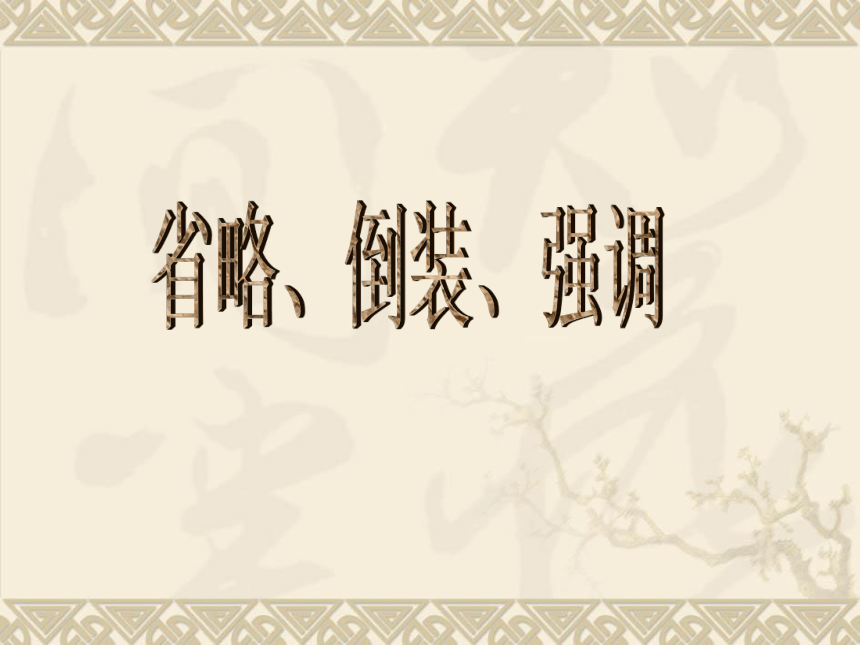
|
|
| 格式 | rar | ||
| 文件大小 | 182.7KB | ||
| 资源类型 | 教案 | ||
| 版本资源 | 通用版 | ||
| 科目 | 英语 | ||
| 更新时间 | 2010-08-08 00:00:00 | ||
图片预览

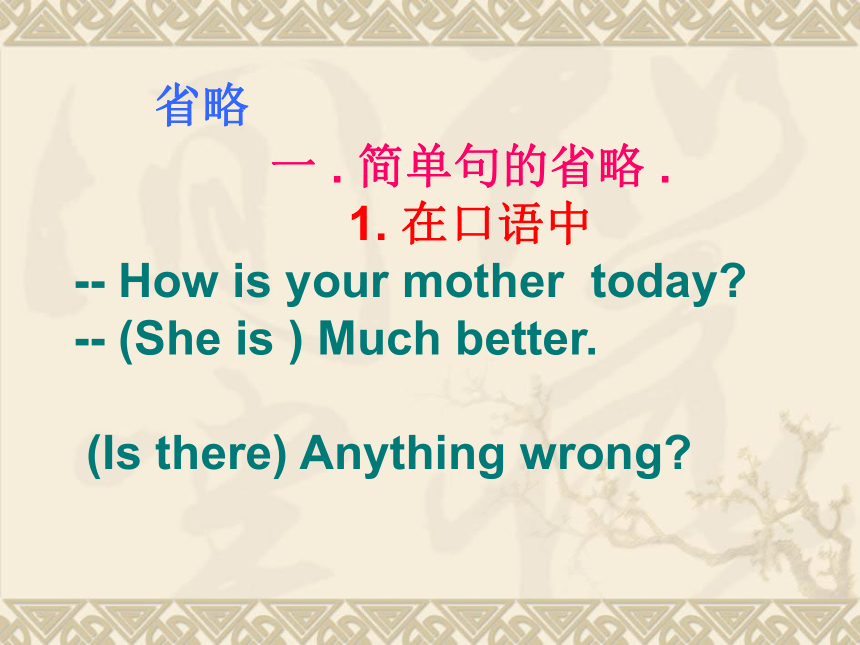
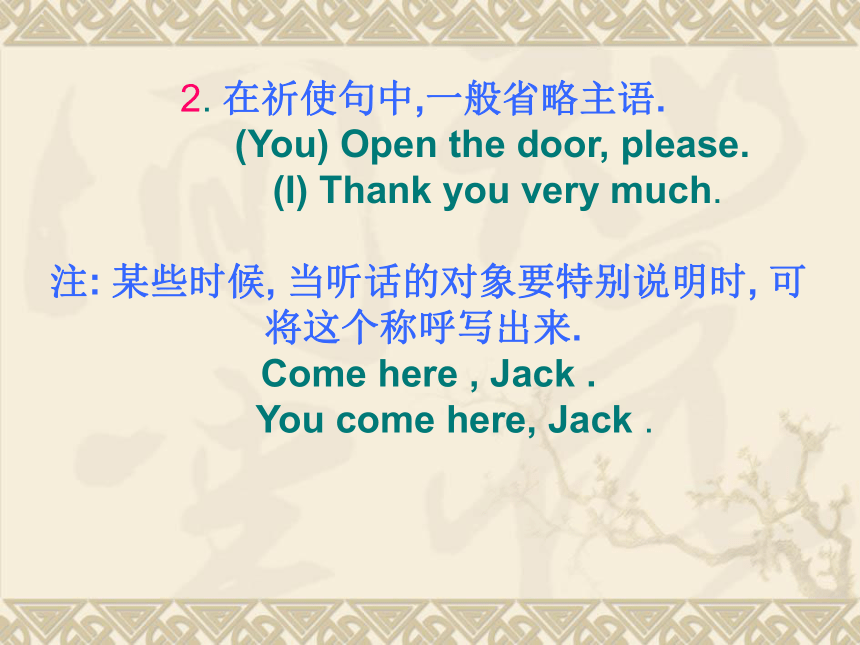
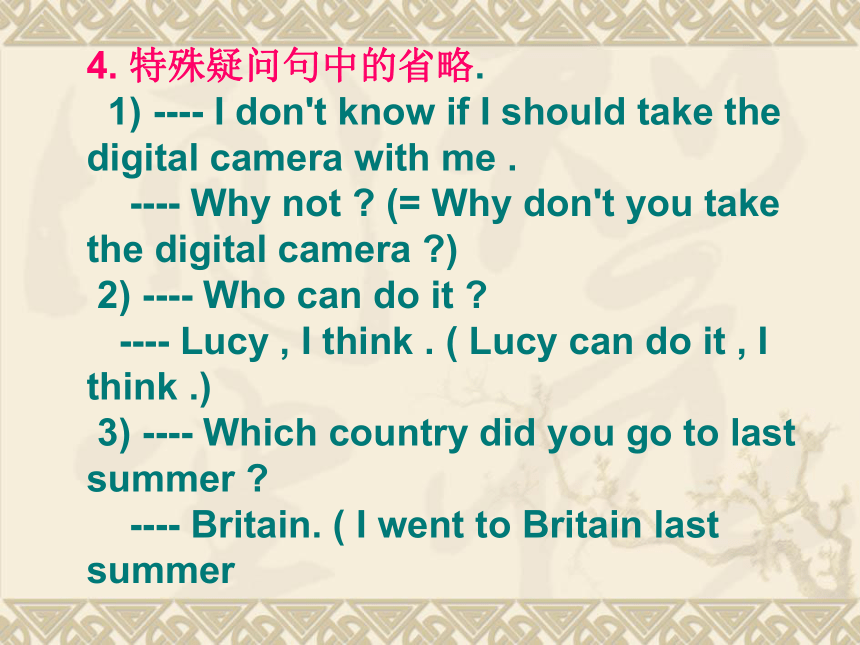
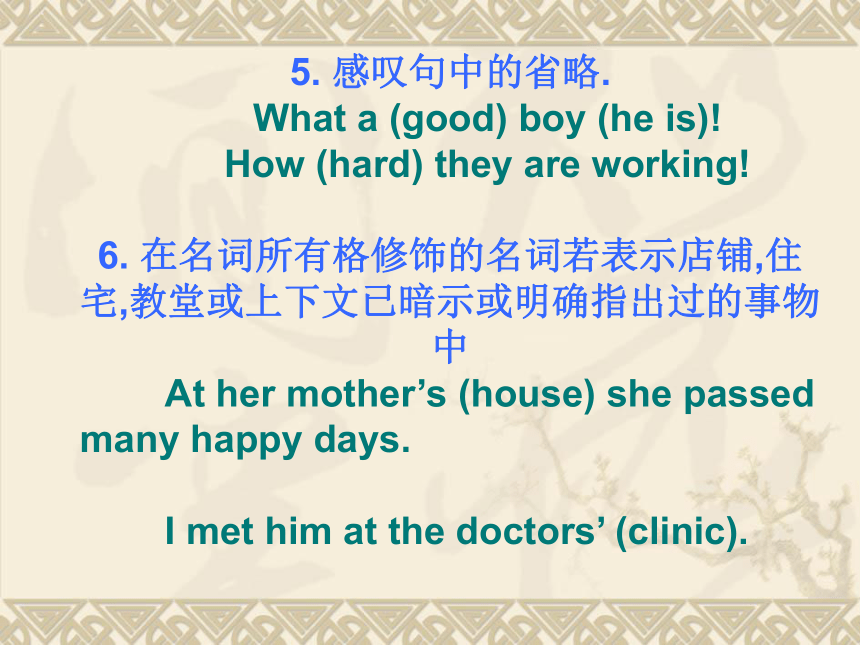
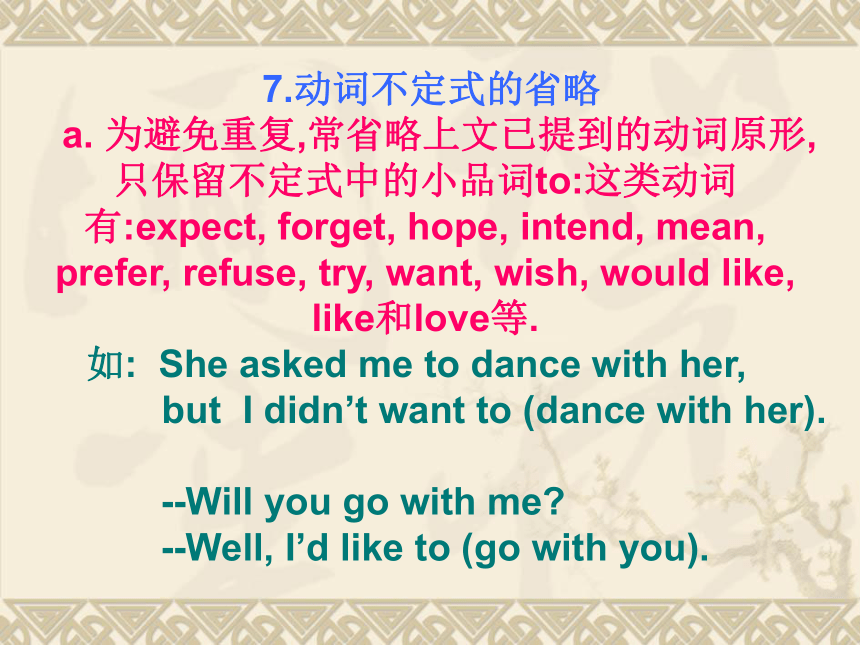

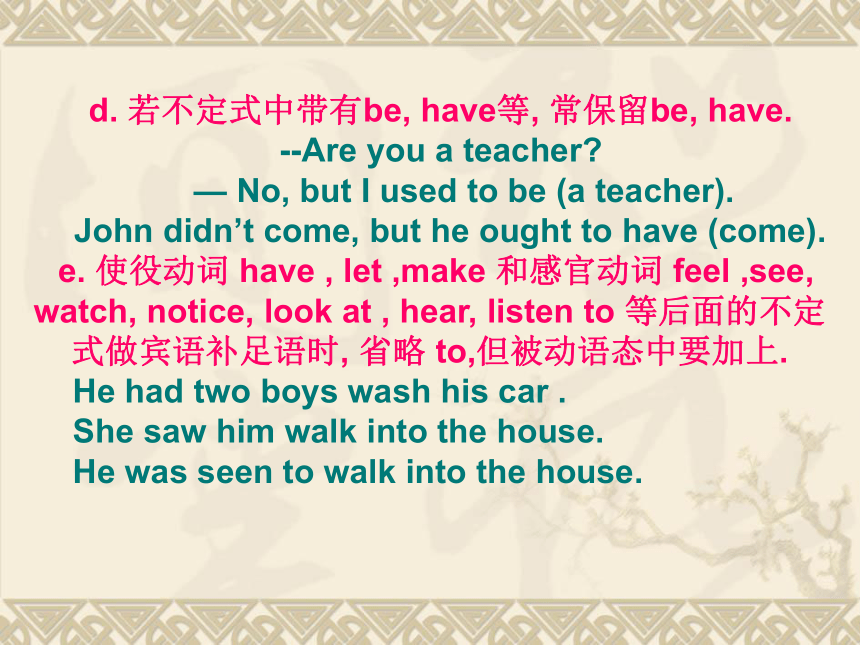
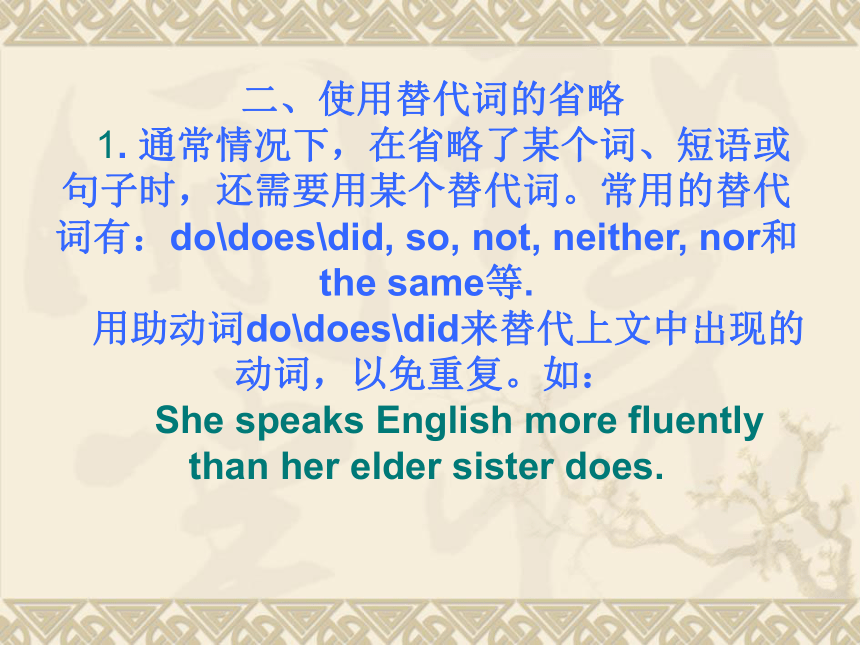
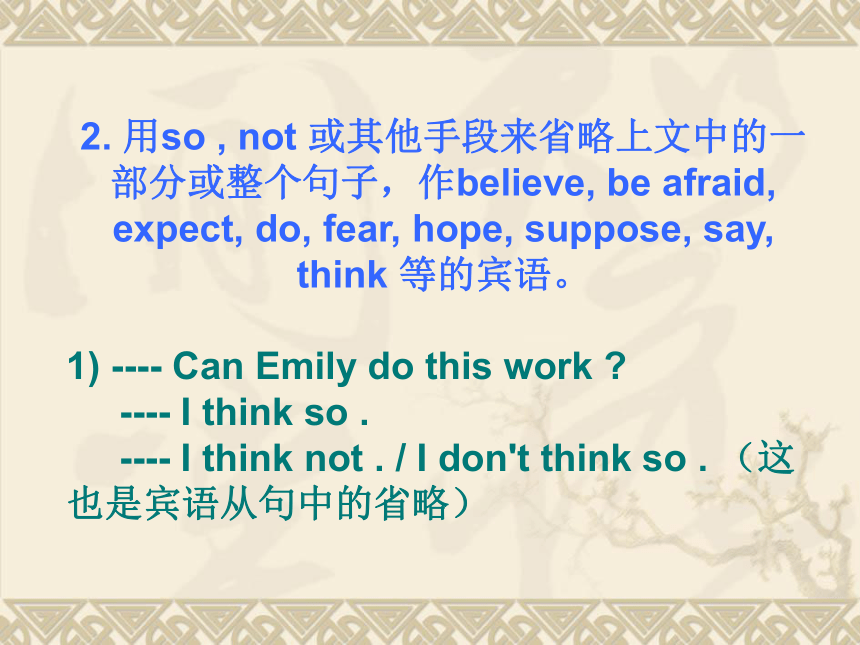
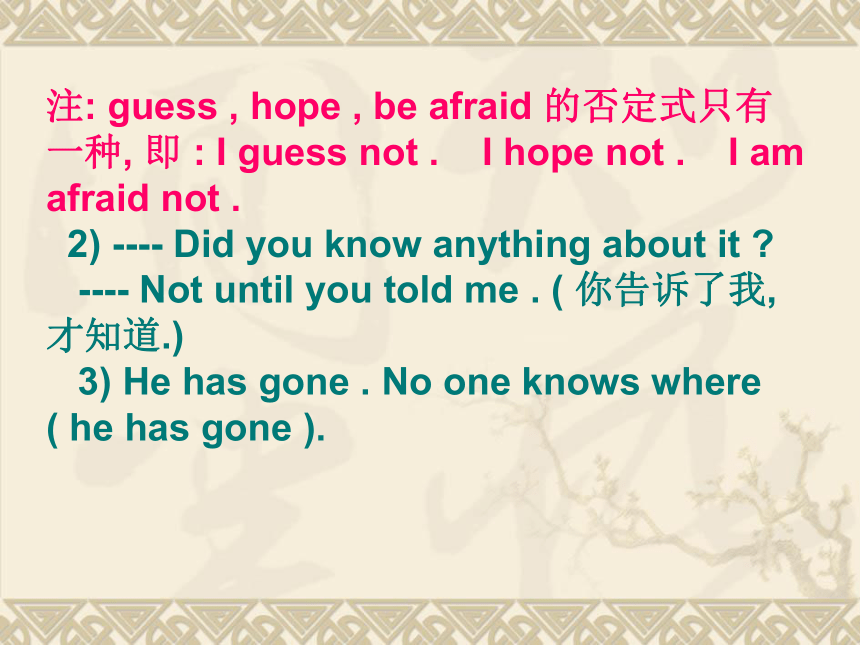
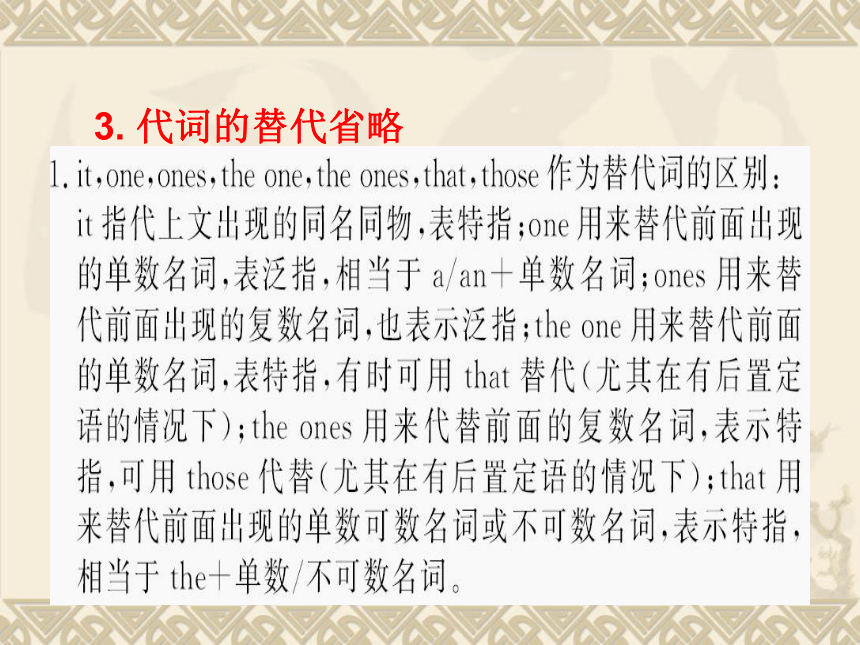
文档简介
课件56张PPT。省略、倒装、强调一 . 简单句的省略 .
1. 在口语中
-- How is your mother today? -- (She is ) Much better.
(Is there) Anything wrong? 省略2. 在祈使句中,一般省略主语.
(You) Open the door, please.
(I) Thank you very much.
注: 某些时候, 当听话的对象要特别说明时, 可将这个称呼写出来.
Come here , Jack .
You come here, Jack .
4. 特殊疑问句中的省略.
1) ---- I don't know if I should take the digital camera with me .
---- Why not ? (= Why don't you take the digital camera ?)
2) ---- Who can do it ?
---- Lucy , I think . ( Lucy can do it , I think .)
3) ---- Which country did you go to last summer ?
---- Britain. ( I went to Britain last summer5. 感叹句中的省略.
What a (good) boy (he is)!
How (hard) they are working!
6. 在名词所有格修饰的名词若表示店铺,住宅,教堂或上下文已暗示或明确指出过的事物中
At her mother’s (house) she passed many happy days.
I met him at the doctors’ (clinic).7.动词不定式的省略
a. 为避免重复,常省略上文已提到的动词原形,只保留不定式中的小品词to:这类动词有:expect, forget, hope, intend, mean, prefer, refuse, try, want, wish, would like, like和love等.
如: She asked me to dance with her,
but I didn’t want to (dance with her).
--Will you go with me?
--Well, I’d like to (go with you).b. 在have to, need, ought to, be going to, used to等后省略动词.
如: I really didn’t want to go there with him, but I had to (go there with him).
c. 在某些形容词delighted, glad, happy, pleased等后省略to后面的动词.
如: ---- Will you join in our discussion?
— I’ll be glad to (join in
your discussion).
d. 若不定式中带有be, have等, 常保留be, have.
--Are you a teacher?
— No, but I used to be (a teacher).
John didn’t come, but he ought to have (come).
e. 使役动词 have , let ,make 和感官动词 feel ,see, watch, notice, look at , hear, listen to 等后面的不定式做宾语补足语时, 省略 to,但被动语态中要加上.
He had two boys wash his car .
She saw him walk into the house.
He was seen to walk into the house.
二、使用替代词的省略
1. 通常情况下,在省略了某个词、短语或句子时,还需要用某个替代词。常用的替代词有:dodoesdid, so, not, neither, nor和the same等.
用助动词dodoesdid来替代上文中出现的动词,以免重复。如:
She speaks English more fluently than her elder sister does.
2. 用so , not 或其他手段来省略上文中的一部分或整个句子,作believe, be afraid, expect, do, fear, hope, suppose, say, think 等的宾语。
1) ---- Can Emily do this work ?
---- I think so .
---- I think not . / I don't think so . (这也是宾语从句中的省略)
注: guess , hope , be afraid 的否定式只有一种, 即 : I guess not . I hope not . I am afraid not .
2) ---- Did you know anything about it ?
---- Not until you told me . ( 你告诉了我, 才知道.)
3) He has gone . No one knows where ( he has gone ).
3. 代词的替代省略 三、并列句中的省略
1. 后面分句中与前面相同的部分常被省略。
如: She was poor but (she was) honest.
Bob has done his homework,
but Tom hasn’t
(done his homework).
2. 有时并列句中的省略部分出现在前面的分句中看完最后一个分句才能掌握全句的完整意义。
如:Mary can (speak English)and (Mary) ought to speak English.
Bob works (in London), and Peter lives in London.
四、复合句中的省略
1. 主语从句的省略
主句的省略多见于句首,多用于口语中。
(It’s a) pity you couldn’t come.
2)在对话中答句省去整个主句只用从句。
--Shall I go to play?
--If you like. (you can go to play) 2.宾语从句中的省略
1)由which, when, where, how和why 引导的宾语从句中与主句重复的主语或谓语,可全部或部分省去,只保留引导词。
如:Please pass me one of these books, I don’t care which (book you pass me).
He will come back, but she doesn’t know when (he will come back).
She wants to learn English well, yet she doesn’t know how (she can learn it well).2) 在I’m afraid, I think, I believe, I hope, I guess, I expect, I suppose, I imagine等开头的作答句中, 后面跟so 与 not 分别用于肯定或否定,宾语从句可省去。
a. —Do you believe our team will win?
—I guess so (your team will win).
—I guess not (your team will not win).
b. —Do you think it will rain?
—I hope so (it will rain).
—I hope not (that it will not rain).
注:I hope so的否定式只能用I hope not,
不可用I don’t hope so.
c. ―Will we be late? ―I'm afraid so /not3.状语从句中的省略:
当状语从句的主语与主句的主语一致,谓语动词含有be时,或状语从句为there be结构时,可以省略状语从句的主语和谓语be,常见结构为:
1).连词as/as if/once+名词
Once( he was) a teacher ,he now works in a government .
2)连词though/whether/when+形容词
Work hard when (you are) young, or you will regret .
3).连词whether /as if /while+介词短语
He looks everywhere as if (he was) looking for something.4)连词when/while/though+现在分词
While (I was )walking in the street, I heard my name called .
5).连词when/if/even if/unless/once/until/than/as+过去分词
The exhibition is more interesting than( it was) expected.
6).连词as if/as though +不定式
He opened his lips as if (he were) to speak.
当状语从句的主语为it ,谓语动词含有be时,可以省略状语从句的主语和谓语be,常见结构为:
连词if/unless/when/whenever+形容词
Unless( it is) necessary, you’d better not refer to the dictionary.7)if+ so/not省略句式, so/not 代替上文内容
Get up early tomorrow morning, if not (you don’t get up early), you will miss the bus.
练习:补充省略部分
1) When in trouble , I always turn to her for help.
2) Errors , if any, should be corrected.
3)He seldom goes to the cinema, if ever.
I amthere is he has ever been
4) Wood gives much smoke while burning.
5) The letter is to be left here until called for .
6) Henry stopped walking as if to wait for her
7) You must eat it when fresh.
wood is
it is
he was
it is
2、 比较状语从句的省略
1) 以as, than 引导的比较状语从句可以全部或部分省去。
如:He got up early as usual (he did).
After half an hour, she became quieter (than she had been).
He studies as hard as you (study).
2)在"the + 比较级... , the +比较级 " 的句型中, 当谓语是be 动词时 , 而且主语非代词时, 常省略动词be.
The older you are , the poorer your memory. (memory will be )
The more I can do , the better (better it will be) 3. 以as soon as 引导的状语从句的主语和主句主语一致时,可用on/upon doing 形式简化状语从句, 此时的动词为瞬间动词.
As soon as he arrived at the village ,
Dr. Bethune began to operate on the wounded soldiers.
~ On /Upon arriving at the village ,
Dr. Bethune began to operate on the wounded soldiers.
4. 定语从句中的省略
1)定语从句的关系代词that /which /who在从句中作主语且后面有be动词,我们可以省略关系代词及be动词.
如:The girl (who is) standing under the tree is Mary.
The bridge (which was) built in 1927 broke down.
The girl (who is) in front of the classroom is Mary.2)在限制性定语从句起宾语作用的关系代词that, which, whom可以省略;在the same... as和such... as引导的定语从句中,可以省略与主句相同的部分;
先行词是 direction(方向) , way(方式) , distance(距离) , time(时间) , times(倍数) 等后面所接的定语从句中常省略that, which, in which 如:
如:He is one of the man (whom) I can trust.
We will do the same work as they (do).
I don’t like the way (that/in which) you speak to your mother.
The direction (in which ) we move a body (物体) can be changed.
The distance (that/ which ) light travels in one second is 300000 kilometers.
5.虚拟语气中的省略
If Thomas Edison had stored his money , he would have died a wealthy man .
Had Thomas Edison stored his money , he would have died a wealthy man .
注: 虚拟语气的 if条件句中省略if把 had(助动词), should , were 提前.
It was suggested that the meeting be put off until the next week .
注: 在表建议,命令,劝告等词后所接虚拟语气的"should +动词原形"中的 should 常省略.五、 在一些固定搭配或句型中省略某些介词
have difficulty (in) doing sth
spend some time / money (in) doing sth
be busy (in) doing sth
waste some time (in) doing sth
have a hard time (in) doing sth
There is no use (in) doing sth
六. 省略语还经常出现在新闻标题或使用说明中
例如:
Newspaper headlines:
Turandot on stage
Signs and labels:
No smoking
Instructions:
Do not bend
Postcards and diaries:
Have not had time to write diary
Notes:
Opera OK, costumes greatLet’s practice.1. He was a swimmer when _______________.
A. to be a child B. a child
C. being a child D. as a child.
2. When ______________ , he worked very hard all his life.
A. was young B. be young
C. being young D. young
While ______________, I paid a visit to the Summer Palace.
A. was in Beijing B. to be in Beijing
C. be in Beijing D. in Beijinghe was a child.he was youngI was in BeijingBDDLet’s practice.4.- I hate talking with that guy. Look, he is coming. What should I do?
-Don’t speak until ________________.
A. speaking B. spoken to
C. spoken D. speaking to
5. The exhibition is more interesting than
_______________.
A.expected B. expect C. expecting D. to expect
6. The man we followed suddenly stopped and looked as if ____________ whether he was going in the right direction. (NMET2003)
A. seeing B. having C. to have seen D. to seeyou are spoken toit was expected.he was to seeBADLet’s practice.7.I wonder why you didn’t do it as ______________.
It’s the third time you have done so.
A. told to B. be told C. told you D. you told
8.Once ____________________ during the
examination, you will be punished.
A. caught cheat B. catching to cheat
C. catch cheating D. caught cheating
9.Ask him to take you home if ____________.
A.is possible B. to be possible
C.possible. D. being possible
10.?_______________ your letter, I would have
written back two days ago.
A. If I received B. Should I receive
C. Had I received D. I could have received
you were told toyou are caught cheatingit is possibleIf I had receivedADCCLet’s practice 2.1.—Why did you take a taxi?
—I _______________. I was late.
A. have to B. have to do C. had to D. had to do
2.He is not _________his sister,but ____________
____________.
A.taller than;stronger B. so tall as;strong
C. taller than;is stronger D. as tall as; stronger
3. —I’m going to dig it up.
—What __________________________?
A. with B. by C. at D. from
4. —Have you been here long?
—______________________________.
A. No,not very B. Not much
C. Yes,only little D. No, only yesterday
had to take a taxi taller than he is stronger
than his sisterare you going to dig it up withNo, I have not been here very longCAAALet’s practice.5. —What do you think made Mary so upset?
—______ her new bicycle________________.
A. As she lost B. Lost
C. Losing D. Because of losing
6. —Don’t forget to come to my birthday party.
—________________________________________.
A.I don’t B.I won’t
C.I don’t forget D.I won’t forget
7. —Be sure to get up earlier tomorrow morning.
—______________________________________.
I’ll be as early as a bird.
A. OK.I will B. I’m afraid I can
C. Of course not D. No,I willLosing made her so upsetI won’t forget to come to your birthday partyOK. I will get up earlier tomorrow morningCBALet’s practice.8.—What’s the matter with you?
—I didn’t pass the test,but I still _______
___________.
A. hope so B. hope to
C. hope it D. hope that
9.I am happy if you _________.
A. happy B. are
C. will D. be
10.—Are you a film star?
—____________________.
A.Yes,I was B.I used to be
C.I used to D.I’m used to
hope to pass the testare happyI used to be a film starBBBLet’s practice. 1.Meeting my uncle after all these years was an
unforgettable moment,_________ I will always treasure.(MNE2002)
A.that B. one C. it D. what
2.You have three children,but I have only two ________.
A. one B. ones C./ D. child
3.— Can I have a cup of black coffee with sugar,
please?
— Give me __________________ , please.
A. it B. the same C. that D. so
a momentchildrenthe same black coffeeBCBLet’s practice4 —I say it is your turn to be on duty today.
—____________________________?
A. Mine B.I C. Myself D. Me
5. — Can you climb that tree,my boy?
—___________________?
A.I B. Mine C. Myself D. Me
6. —Why didn’t you do your homework yesterday?
—But ____________________,sir.
A.I did so B.I didn’t do it
C.I didn’t forget D.I did do it
I often think of my childhood, during
_____________ I lived on my uncle’s farm.
A. which B. when C. where D. who
Is it my turn to be on duty todayCan I climb that treeI did do my homework(my childhood)ADDALet’s practice.8. —May I help you with some shoes,sir?
—Yes,I’d like to try on those white __________.
A. one B. ones C. two D. pair
9. —What’s the difference between the first house and the second?
—The first one has a garage while the second has _________.
A. nothing B. none
C. no one D. neither
10. Canada has a large area than _________ China.
A. that of B. the one of
C. it of D./shoes/pairsno garagethe area ofBB(nobody)A倒装倒装句的高考考点:
一 全部倒装
1. 在以here、there、now、then、off、away等副词开头的句子里。
2. 表示地点的介词短语位于句首时。
二 部分倒装
1、Only+状语位于句首时
2、否定副词位于句首时
3在省去if的虚拟条件从句中。
4、So Neither Nor 位于句首时
5、as引导的让步状语从句
6、特殊句式完全倒装:
1. 在以here、there、now、then、off、away等副词开头的句子里。
(1) The birds flew away.
Away flew the birds.
(2) The rain came down.
Down came the rain
2. 表示地点的介词短语位于句首时。
(1)山脚下有一个美丽的湖。
At the foot of the hill lies a beautiful lake
(2)教室外面站着一个男孩。
Outside the classroom stood a boy.
注意:在上述句子中,如果主语为人称代词,则主、谓不需要倒装。 ??? In he came and back he went again. 1、Just in front of our house ____ with a history of 1000 years. (2006上海春季,34)
A. does a tall tree stand B. stands a tall tree.
C. a tall tree is standing D. a tall tree stands
2、Look over there. ______!(2007年安徽,22)
A、Around the corner is walking a policeman.
B、Around the corner is a policeman walking.
C、Around the corner a policeman is walking.
D、Around the corner policemen are walking部分倒装:
1. Only+状语位于句首时
1)He only found it important to get along with others then.
Only then did he find it important to get along with others.
2)We can only make great progress in this way.
Only in this way can we make great progress.注意: ⑴当only引导的短语做主语时,主、谓则不发生任何倒装。
只有五个学生能回答这个问题。
Only five students can answer this question. ?
注意:⑵only后接状语从句时,该从句一定是陈述语序。
He only realizes how nice home is when one is away from home.
Only when one is away from home does he realize how nice home is.高考真题再现:
1、Only then ____ how much damage had been caused.
A、had she realized B. she realized
C. did she realize D. she had realized
2、 Only after my friend came ______.
A、did the computer repair
B、he repaired the computer
C、was the computer repaired
D、the computer was repaired 2. 否定副词及短语位于句首时。
高考常考的这类词或词语有:not, seldom, hardly, little, nowhere, by no means, in no time等 。
我从没见过如此美丽的地方。
I have never seen such a beautiful place
Never have I seen such a beautiful place.1. I’ve tried very hard to improve my English. But by no means _____ with my progress. (2006年重庆,24)
A、the teacher is not satisfied
B、is the teacher not satisfied
C、the teacher is satisfied
D. is the teacher satisfied
2、Maybe you have been to many countries, but nowhere else ___ such a beautiful palace.(2004年辽宁, 26)
A、can you find B. you could find
C. you can find D. could you find 3 在省略if的虚拟条件从句中
(1)如果我是你,我会努力学习。
Were I you, I would work hard
(2)如果明天下雨的话,我们就延迟会议。
Should it rain tomorrow, we would put off our meeting.
(3)假如他听从了我的建议,他早就 成功了。
Had he followed my advice, he would have succeeded.
If it were not for his teacher’s help, he would never graduate from this high school
Were it not for his teacher’s help, he would never graduate from this high school. 注意:我们可以说Were it not...或者Had it not been..., 但不可以说Weren’ t it... 或者hadn’t it been...
4、so neither nor 位于句首的情况。
(1)So + 助动词 +主语
So + 主语 + 助动词
高考真题再现:
1. --Father, you promised.
-- Well, _______. But it was you who didn’t keep your word first.
A、so was I B. so did I
C. so I was. D. so I did (2)Neither 和 Nor 用于否定句,表示“ 也不,也没有”。
Neither Nor +助动词+主语
高考真题再现:
(1) --I would never come to this restaurant again. The food is terrible.
--______! (2004全国卷,32)
A、Nor am I B. Neither would I
C. Same with me D. So do I 易错题:
1、I wonder if your wife will go to the ball. If your wife _____, so _____ mine.
A、does , will B. will, does
C. will, would D. does, do
2、--I seldom watch TV, but listen to the radio a lot.
-- _____.
A、So do I B. Neither do I
C. So I have D. So it is with me. 5、as引导的让步状语从句
名词形容词副词动词+asthough+主语+其他
我很丑,可是我很温柔。
Ugly as I am, I am gentle.
尽管他是一个孩子,他不得不谋生。
Child as he is, he has to make a living.
尽管我很努力去试,我还是打不开这扇门。
Try as I might, I couldn’t open the door.
注意:从句的表语是名词,其名词前不加任何冠词6、用在作频度状语often,always,once, many a time, now and again, every other day, every two hours等,方式状语thus及程度状语so 等,地点状语in the distance, in front of 等的几种副词或介词短语开头的句子中。
Often had I intended to speak of it.
Many a time has he helped me with my work.1. Many a time ______ swimming alone. ? A. the boy went? B. went the boy??
C. did the boy go? D. did go the boy 2. Beneath our feet ______ that our life depends on for food and clothing. A. the earth lay? ?B. the earth lies??
? ?C. lie the earth??? ?D. lies the earth 7、特殊倒装句型:
(1)not only … but also… 句式的倒装
他不仅对足球感兴趣,而且踢得很好。
He is not only interested in football but also he plays it well.
Not only is he interested in football but also he plays it well.
(2)在“so + adj./adv. + that…”句式中,将“so + adj./adv. ”放在句首时的倒装。
他学习是如此的努力以致于他在英语上取得了很大的进步。
He works so hard that he has made great progress in English.
So hard does he work that he has made great progress in English.3)not until 引导的从句位于句首引起的倒装
直到他的妈妈回来,他才完成作业。
He didn’t finish his homework until his mother came back.
Not until his mother came back did he finish his homework.
(4) 一…就…
no sooner had ….than ,hardly had …..when
他一到伦敦就买了房子。
Hardly had he settled down in London when he bought a house.
No sooner had he settled down in London than he bought a house.GoodbyeThank you
1. 在口语中
-- How is your mother today? -- (She is ) Much better.
(Is there) Anything wrong? 省略2. 在祈使句中,一般省略主语.
(You) Open the door, please.
(I) Thank you very much.
注: 某些时候, 当听话的对象要特别说明时, 可将这个称呼写出来.
Come here , Jack .
You come here, Jack .
4. 特殊疑问句中的省略.
1) ---- I don't know if I should take the digital camera with me .
---- Why not ? (= Why don't you take the digital camera ?)
2) ---- Who can do it ?
---- Lucy , I think . ( Lucy can do it , I think .)
3) ---- Which country did you go to last summer ?
---- Britain. ( I went to Britain last summer5. 感叹句中的省略.
What a (good) boy (he is)!
How (hard) they are working!
6. 在名词所有格修饰的名词若表示店铺,住宅,教堂或上下文已暗示或明确指出过的事物中
At her mother’s (house) she passed many happy days.
I met him at the doctors’ (clinic).7.动词不定式的省略
a. 为避免重复,常省略上文已提到的动词原形,只保留不定式中的小品词to:这类动词有:expect, forget, hope, intend, mean, prefer, refuse, try, want, wish, would like, like和love等.
如: She asked me to dance with her,
but I didn’t want to (dance with her).
--Will you go with me?
--Well, I’d like to (go with you).b. 在have to, need, ought to, be going to, used to等后省略动词.
如: I really didn’t want to go there with him, but I had to (go there with him).
c. 在某些形容词delighted, glad, happy, pleased等后省略to后面的动词.
如: ---- Will you join in our discussion?
— I’ll be glad to (join in
your discussion).
d. 若不定式中带有be, have等, 常保留be, have.
--Are you a teacher?
— No, but I used to be (a teacher).
John didn’t come, but he ought to have (come).
e. 使役动词 have , let ,make 和感官动词 feel ,see, watch, notice, look at , hear, listen to 等后面的不定式做宾语补足语时, 省略 to,但被动语态中要加上.
He had two boys wash his car .
She saw him walk into the house.
He was seen to walk into the house.
二、使用替代词的省略
1. 通常情况下,在省略了某个词、短语或句子时,还需要用某个替代词。常用的替代词有:dodoesdid, so, not, neither, nor和the same等.
用助动词dodoesdid来替代上文中出现的动词,以免重复。如:
She speaks English more fluently than her elder sister does.
2. 用so , not 或其他手段来省略上文中的一部分或整个句子,作believe, be afraid, expect, do, fear, hope, suppose, say, think 等的宾语。
1) ---- Can Emily do this work ?
---- I think so .
---- I think not . / I don't think so . (这也是宾语从句中的省略)
注: guess , hope , be afraid 的否定式只有一种, 即 : I guess not . I hope not . I am afraid not .
2) ---- Did you know anything about it ?
---- Not until you told me . ( 你告诉了我, 才知道.)
3) He has gone . No one knows where ( he has gone ).
3. 代词的替代省略 三、并列句中的省略
1. 后面分句中与前面相同的部分常被省略。
如: She was poor but (she was) honest.
Bob has done his homework,
but Tom hasn’t
(done his homework).
2. 有时并列句中的省略部分出现在前面的分句中看完最后一个分句才能掌握全句的完整意义。
如:Mary can (speak English)and (Mary) ought to speak English.
Bob works (in London), and Peter lives in London.
四、复合句中的省略
1. 主语从句的省略
主句的省略多见于句首,多用于口语中。
(It’s a) pity you couldn’t come.
2)在对话中答句省去整个主句只用从句。
--Shall I go to play?
--If you like. (you can go to play) 2.宾语从句中的省略
1)由which, when, where, how和why 引导的宾语从句中与主句重复的主语或谓语,可全部或部分省去,只保留引导词。
如:Please pass me one of these books, I don’t care which (book you pass me).
He will come back, but she doesn’t know when (he will come back).
She wants to learn English well, yet she doesn’t know how (she can learn it well).2) 在I’m afraid, I think, I believe, I hope, I guess, I expect, I suppose, I imagine等开头的作答句中, 后面跟so 与 not 分别用于肯定或否定,宾语从句可省去。
a. —Do you believe our team will win?
—I guess so (your team will win).
—I guess not (your team will not win).
b. —Do you think it will rain?
—I hope so (it will rain).
—I hope not (that it will not rain).
注:I hope so的否定式只能用I hope not,
不可用I don’t hope so.
c. ―Will we be late? ―I'm afraid so /not3.状语从句中的省略:
当状语从句的主语与主句的主语一致,谓语动词含有be时,或状语从句为there be结构时,可以省略状语从句的主语和谓语be,常见结构为:
1).连词as/as if/once+名词
Once( he was) a teacher ,he now works in a government .
2)连词though/whether/when+形容词
Work hard when (you are) young, or you will regret .
3).连词whether /as if /while+介词短语
He looks everywhere as if (he was) looking for something.4)连词when/while/though+现在分词
While (I was )walking in the street, I heard my name called .
5).连词when/if/even if/unless/once/until/than/as+过去分词
The exhibition is more interesting than( it was) expected.
6).连词as if/as though +不定式
He opened his lips as if (he were) to speak.
当状语从句的主语为it ,谓语动词含有be时,可以省略状语从句的主语和谓语be,常见结构为:
连词if/unless/when/whenever+形容词
Unless( it is) necessary, you’d better not refer to the dictionary.7)if+ so/not省略句式, so/not 代替上文内容
Get up early tomorrow morning, if not (you don’t get up early), you will miss the bus.
练习:补充省略部分
1) When in trouble , I always turn to her for help.
2) Errors , if any, should be corrected.
3)He seldom goes to the cinema, if ever.
I amthere is he has ever been
4) Wood gives much smoke while burning.
5) The letter is to be left here until called for .
6) Henry stopped walking as if to wait for her
7) You must eat it when fresh.
wood is
it is
he was
it is
2、 比较状语从句的省略
1) 以as, than 引导的比较状语从句可以全部或部分省去。
如:He got up early as usual (he did).
After half an hour, she became quieter (than she had been).
He studies as hard as you (study).
2)在"the + 比较级... , the +比较级 " 的句型中, 当谓语是be 动词时 , 而且主语非代词时, 常省略动词be.
The older you are , the poorer your memory. (memory will be )
The more I can do , the better (better it will be) 3. 以as soon as 引导的状语从句的主语和主句主语一致时,可用on/upon doing 形式简化状语从句, 此时的动词为瞬间动词.
As soon as he arrived at the village ,
Dr. Bethune began to operate on the wounded soldiers.
~ On /Upon arriving at the village ,
Dr. Bethune began to operate on the wounded soldiers.
4. 定语从句中的省略
1)定语从句的关系代词that /which /who在从句中作主语且后面有be动词,我们可以省略关系代词及be动词.
如:The girl (who is) standing under the tree is Mary.
The bridge (which was) built in 1927 broke down.
The girl (who is) in front of the classroom is Mary.2)在限制性定语从句起宾语作用的关系代词that, which, whom可以省略;在the same... as和such... as引导的定语从句中,可以省略与主句相同的部分;
先行词是 direction(方向) , way(方式) , distance(距离) , time(时间) , times(倍数) 等后面所接的定语从句中常省略that, which, in which 如:
如:He is one of the man (whom) I can trust.
We will do the same work as they (do).
I don’t like the way (that/in which) you speak to your mother.
The direction (in which ) we move a body (物体) can be changed.
The distance (that/ which ) light travels in one second is 300000 kilometers.
5.虚拟语气中的省略
If Thomas Edison had stored his money , he would have died a wealthy man .
Had Thomas Edison stored his money , he would have died a wealthy man .
注: 虚拟语气的 if条件句中省略if把 had(助动词), should , were 提前.
It was suggested that the meeting be put off until the next week .
注: 在表建议,命令,劝告等词后所接虚拟语气的"should +动词原形"中的 should 常省略.五、 在一些固定搭配或句型中省略某些介词
have difficulty (in) doing sth
spend some time / money (in) doing sth
be busy (in) doing sth
waste some time (in) doing sth
have a hard time (in) doing sth
There is no use (in) doing sth
六. 省略语还经常出现在新闻标题或使用说明中
例如:
Newspaper headlines:
Turandot on stage
Signs and labels:
No smoking
Instructions:
Do not bend
Postcards and diaries:
Have not had time to write diary
Notes:
Opera OK, costumes greatLet’s practice.1. He was a swimmer when _______________.
A. to be a child B. a child
C. being a child D. as a child.
2. When ______________ , he worked very hard all his life.
A. was young B. be young
C. being young D. young
While ______________, I paid a visit to the Summer Palace.
A. was in Beijing B. to be in Beijing
C. be in Beijing D. in Beijinghe was a child.he was youngI was in BeijingBDDLet’s practice.4.- I hate talking with that guy. Look, he is coming. What should I do?
-Don’t speak until ________________.
A. speaking B. spoken to
C. spoken D. speaking to
5. The exhibition is more interesting than
_______________.
A.expected B. expect C. expecting D. to expect
6. The man we followed suddenly stopped and looked as if ____________ whether he was going in the right direction. (NMET2003)
A. seeing B. having C. to have seen D. to seeyou are spoken toit was expected.he was to seeBADLet’s practice.7.I wonder why you didn’t do it as ______________.
It’s the third time you have done so.
A. told to B. be told C. told you D. you told
8.Once ____________________ during the
examination, you will be punished.
A. caught cheat B. catching to cheat
C. catch cheating D. caught cheating
9.Ask him to take you home if ____________.
A.is possible B. to be possible
C.possible. D. being possible
10.?_______________ your letter, I would have
written back two days ago.
A. If I received B. Should I receive
C. Had I received D. I could have received
you were told toyou are caught cheatingit is possibleIf I had receivedADCCLet’s practice 2.1.—Why did you take a taxi?
—I _______________. I was late.
A. have to B. have to do C. had to D. had to do
2.He is not _________his sister,but ____________
____________.
A.taller than;stronger B. so tall as;strong
C. taller than;is stronger D. as tall as; stronger
3. —I’m going to dig it up.
—What __________________________?
A. with B. by C. at D. from
4. —Have you been here long?
—______________________________.
A. No,not very B. Not much
C. Yes,only little D. No, only yesterday
had to take a taxi taller than he is stronger
than his sisterare you going to dig it up withNo, I have not been here very longCAAALet’s practice.5. —What do you think made Mary so upset?
—______ her new bicycle________________.
A. As she lost B. Lost
C. Losing D. Because of losing
6. —Don’t forget to come to my birthday party.
—________________________________________.
A.I don’t B.I won’t
C.I don’t forget D.I won’t forget
7. —Be sure to get up earlier tomorrow morning.
—______________________________________.
I’ll be as early as a bird.
A. OK.I will B. I’m afraid I can
C. Of course not D. No,I willLosing made her so upsetI won’t forget to come to your birthday partyOK. I will get up earlier tomorrow morningCBALet’s practice.8.—What’s the matter with you?
—I didn’t pass the test,but I still _______
___________.
A. hope so B. hope to
C. hope it D. hope that
9.I am happy if you _________.
A. happy B. are
C. will D. be
10.—Are you a film star?
—____________________.
A.Yes,I was B.I used to be
C.I used to D.I’m used to
hope to pass the testare happyI used to be a film starBBBLet’s practice. 1.Meeting my uncle after all these years was an
unforgettable moment,_________ I will always treasure.(MNE2002)
A.that B. one C. it D. what
2.You have three children,but I have only two ________.
A. one B. ones C./ D. child
3.— Can I have a cup of black coffee with sugar,
please?
— Give me __________________ , please.
A. it B. the same C. that D. so
a momentchildrenthe same black coffeeBCBLet’s practice4 —I say it is your turn to be on duty today.
—____________________________?
A. Mine B.I C. Myself D. Me
5. — Can you climb that tree,my boy?
—___________________?
A.I B. Mine C. Myself D. Me
6. —Why didn’t you do your homework yesterday?
—But ____________________,sir.
A.I did so B.I didn’t do it
C.I didn’t forget D.I did do it
I often think of my childhood, during
_____________ I lived on my uncle’s farm.
A. which B. when C. where D. who
Is it my turn to be on duty todayCan I climb that treeI did do my homework(my childhood)ADDALet’s practice.8. —May I help you with some shoes,sir?
—Yes,I’d like to try on those white __________.
A. one B. ones C. two D. pair
9. —What’s the difference between the first house and the second?
—The first one has a garage while the second has _________.
A. nothing B. none
C. no one D. neither
10. Canada has a large area than _________ China.
A. that of B. the one of
C. it of D./shoes/pairsno garagethe area ofBB(nobody)A倒装倒装句的高考考点:
一 全部倒装
1. 在以here、there、now、then、off、away等副词开头的句子里。
2. 表示地点的介词短语位于句首时。
二 部分倒装
1、Only+状语位于句首时
2、否定副词位于句首时
3在省去if的虚拟条件从句中。
4、So Neither Nor 位于句首时
5、as引导的让步状语从句
6、特殊句式完全倒装:
1. 在以here、there、now、then、off、away等副词开头的句子里。
(1) The birds flew away.
Away flew the birds.
(2) The rain came down.
Down came the rain
2. 表示地点的介词短语位于句首时。
(1)山脚下有一个美丽的湖。
At the foot of the hill lies a beautiful lake
(2)教室外面站着一个男孩。
Outside the classroom stood a boy.
注意:在上述句子中,如果主语为人称代词,则主、谓不需要倒装。 ??? In he came and back he went again. 1、Just in front of our house ____ with a history of 1000 years. (2006上海春季,34)
A. does a tall tree stand B. stands a tall tree.
C. a tall tree is standing D. a tall tree stands
2、Look over there. ______!(2007年安徽,22)
A、Around the corner is walking a policeman.
B、Around the corner is a policeman walking.
C、Around the corner a policeman is walking.
D、Around the corner policemen are walking部分倒装:
1. Only+状语位于句首时
1)He only found it important to get along with others then.
Only then did he find it important to get along with others.
2)We can only make great progress in this way.
Only in this way can we make great progress.注意: ⑴当only引导的短语做主语时,主、谓则不发生任何倒装。
只有五个学生能回答这个问题。
Only five students can answer this question. ?
注意:⑵only后接状语从句时,该从句一定是陈述语序。
He only realizes how nice home is when one is away from home.
Only when one is away from home does he realize how nice home is.高考真题再现:
1、Only then ____ how much damage had been caused.
A、had she realized B. she realized
C. did she realize D. she had realized
2、 Only after my friend came ______.
A、did the computer repair
B、he repaired the computer
C、was the computer repaired
D、the computer was repaired 2. 否定副词及短语位于句首时。
高考常考的这类词或词语有:not, seldom, hardly, little, nowhere, by no means, in no time等 。
我从没见过如此美丽的地方。
I have never seen such a beautiful place
Never have I seen such a beautiful place.1. I’ve tried very hard to improve my English. But by no means _____ with my progress. (2006年重庆,24)
A、the teacher is not satisfied
B、is the teacher not satisfied
C、the teacher is satisfied
D. is the teacher satisfied
2、Maybe you have been to many countries, but nowhere else ___ such a beautiful palace.(2004年辽宁, 26)
A、can you find B. you could find
C. you can find D. could you find 3 在省略if的虚拟条件从句中
(1)如果我是你,我会努力学习。
Were I you, I would work hard
(2)如果明天下雨的话,我们就延迟会议。
Should it rain tomorrow, we would put off our meeting.
(3)假如他听从了我的建议,他早就 成功了。
Had he followed my advice, he would have succeeded.
If it were not for his teacher’s help, he would never graduate from this high school
Were it not for his teacher’s help, he would never graduate from this high school. 注意:我们可以说Were it not...或者Had it not been..., 但不可以说Weren’ t it... 或者hadn’t it been...
4、so neither nor 位于句首的情况。
(1)So + 助动词 +主语
So + 主语 + 助动词
高考真题再现:
1. --Father, you promised.
-- Well, _______. But it was you who didn’t keep your word first.
A、so was I B. so did I
C. so I was. D. so I did (2)Neither 和 Nor 用于否定句,表示“ 也不,也没有”。
Neither Nor +助动词+主语
高考真题再现:
(1) --I would never come to this restaurant again. The food is terrible.
--______! (2004全国卷,32)
A、Nor am I B. Neither would I
C. Same with me D. So do I 易错题:
1、I wonder if your wife will go to the ball. If your wife _____, so _____ mine.
A、does , will B. will, does
C. will, would D. does, do
2、--I seldom watch TV, but listen to the radio a lot.
-- _____.
A、So do I B. Neither do I
C. So I have D. So it is with me. 5、as引导的让步状语从句
名词形容词副词动词+asthough+主语+其他
我很丑,可是我很温柔。
Ugly as I am, I am gentle.
尽管他是一个孩子,他不得不谋生。
Child as he is, he has to make a living.
尽管我很努力去试,我还是打不开这扇门。
Try as I might, I couldn’t open the door.
注意:从句的表语是名词,其名词前不加任何冠词6、用在作频度状语often,always,once, many a time, now and again, every other day, every two hours等,方式状语thus及程度状语so 等,地点状语in the distance, in front of 等的几种副词或介词短语开头的句子中。
Often had I intended to speak of it.
Many a time has he helped me with my work.1. Many a time ______ swimming alone. ? A. the boy went? B. went the boy??
C. did the boy go? D. did go the boy 2. Beneath our feet ______ that our life depends on for food and clothing. A. the earth lay? ?B. the earth lies??
? ?C. lie the earth??? ?D. lies the earth 7、特殊倒装句型:
(1)not only … but also… 句式的倒装
他不仅对足球感兴趣,而且踢得很好。
He is not only interested in football but also he plays it well.
Not only is he interested in football but also he plays it well.
(2)在“so + adj./adv. + that…”句式中,将“so + adj./adv. ”放在句首时的倒装。
他学习是如此的努力以致于他在英语上取得了很大的进步。
He works so hard that he has made great progress in English.
So hard does he work that he has made great progress in English.3)not until 引导的从句位于句首引起的倒装
直到他的妈妈回来,他才完成作业。
He didn’t finish his homework until his mother came back.
Not until his mother came back did he finish his homework.
(4) 一…就…
no sooner had ….than ,hardly had …..when
他一到伦敦就买了房子。
Hardly had he settled down in London when he bought a house.
No sooner had he settled down in London than he bought a house.GoodbyeThank you
